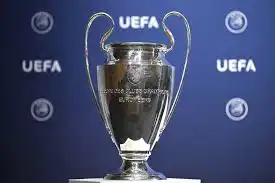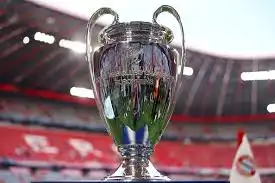European Football Tournament

The UEFA Champions League is the most prestigious club competition in Europe. It is a tournament where the greatest teams from around the continent battle to win the ultimate footballing glory. Every season, the greatest clubs from top European leagues face battle in the UEFA European Championship, battling for a chance to capture the prized trophy. Football fans around the world eagerly await the champions league table each year, as they display some of the top talent in the sport. The UEFA Champions League has been host to several outstanding players and historic matches.
Understanding the Tournament Format
The format of the UEFA Champions League is designed to test the skill and resilience of teams. It begins with a group stage, where teams are sorted into groups, and each team confronts home and away matches. The top two teams from each group advance to the knockout rounds, which consist of two legs for each matchup. These heated matchups determine which teams will make it to the Champions League final. The competition is noted for its spectacular moments and surprise upsets. It’s little wonder that the UEFA Champions League grabs so much attention from fans and journalists.
The Role of Clubs in the UEFA Champions League
Clubs in the UEFA Champions League are not simply contending for the trophy; they’re competing for reputation, financial incentives, and international recognition. By advancing through the stages, teams receive crucial points, and those who perform well secure a berth in the following year’s competition. The Champions League table is closely observed by fans as it follows the progress of each team. Clubs like Barcelona, Bayern Munich, and Real Madrid are generally prominent contenders in this competition, highlighting the value of sustained success.
The Road to the Champions League Final:
Reaching the Champions League final is a long and demanding road. Teams must travel through multiple rounds, each more demanding than the previous. From the group stage to the knockout rounds, every encounter is an opportunity for clubs to prove their worth. The knockout rounds are more intense, since teams face off in two-legged ties. The aggregate score from both legs determines the winner. Only the strongest teams make it to the Champions League final, where they will compete for European glory.
Navigating the Group Stage
The group stage of the UEFA Champions League consists of eight groups of four clubs each. Every team plays six matches, facing each of the other teams in the group twice, home and away. The top two teams from each group proceed to the knockout rounds, while the third-place team moves to the Europa League. Fans anxiously monitor the Champions League matchups to see which teams will clinch their place in the knockout rounds. This stage sets the tone for the rest of the tournament, as clubs compete for place in the Champions League standings.
The Knockout Rounds:
Once the group stage closes, the UEFA Champions League transitions onto the knockout stages. This is when the true drama unfolds. Each tie is played over two legs, and the aggregate score determines who progresses. The knockout rounds see top teams from across Europe face battle in high-stakes matches, with each team fighting to earn a position in the Champions League final. The intensity and unpredictability of the knockout stage are what make the UEFA Champions League so exhilarating to watch.
UEFA Champions League Fixtures:
The release of the Champions League fixtures signals the beginning of the excitement for football fans around the world. These fixtures set the backdrop for some of the biggest matchups in European football. Fans excitedly wait to see when their favorite teams will face off against one other. The Champions League fixtures not only establish the competition schedule but also create a sense of anticipation for what’s to come. Clubs and their followers alike look forward to each encounter, as every game presents the opportunity for drama, shocks, and unforgettable moments.
The Importance of Fixtures in Shaping the Tournament
The UEFA Champions League matches are crucial not just for fans, but also for the clubs. The matches offer an opportunity to secure critical points in the group stage, or to progress through the knockout stages. For top teams, every Champions League tie is essential to their hopes of making it to the Champions League final. These matchups shape the course of the competition and determine which teams will continue their trek for European success.
Anticipated Matchups and Rivalries
Each year, certain matchups in the UEFA Champions League are eagerly anticipated owing to historic rivalries or the participation of famous players. Clubs like Barcelona, Bayern Munich, and Manchester United regularly have tough battles in the knockout stages. These confrontations generate a lot of excitement and curiosity, as spectators wonder who will come out on top. As the Champions League schedules are released, supporters eagerly mark their calendars for these high-stakes matches that could ultimately determine the Champions League standings.
The Champions League Table
 The Champions League table is vital for knowing how teams are performing during the tournament. It provides a picture of each team’s status in their group and gives an overview of the entire competition. After every round of matches, the Champions League table is updated to reflect the current results. Teams that do well in their group stages can clinch a position in the knockout rounds, while the worst teams face elimination. For supporters, tracking the Champions League standings is a means to watch their team’s progress as they aspire for a berth in the Champions League final.
The Champions League table is vital for knowing how teams are performing during the tournament. It provides a picture of each team’s status in their group and gives an overview of the entire competition. After every round of matches, the Champions League table is updated to reflect the current results. Teams that do well in their group stages can clinch a position in the knockout rounds, while the worst teams face elimination. For supporters, tracking the Champions League standings is a means to watch their team’s progress as they aspire for a berth in the Champions League final.
How the Table Reflects Team Performance
The UEFA Champions League table is a direct indication of how well teams are performing in the tournament. Points are awarded for wins and draws, and goal difference can often play a key part in determining the standings. As the group stage unfolds, the Champions League table offers a clear picture of which clubs are likely to proceed to the knockout rounds and which teams are battling to stay up. For fans, the table provides a chance to judge how their team is faring versus other European powers.
Impact of the Table on Knockout Rounds
Once the group stage closes, the Champions League table plays a significant part in establishing opponents for the knockout stages. The top two teams from each group advance, and their position in the table can effect the draw. Teams finishing first may meet second-place teams from different groups, which can damage their prospects of moving further. The Champions League table is therefore vital for understanding the dynamics of the tournament as it moves toward the Champions League final.
Memorable Moments in UEFA Champions League History
Over the years, the UEFA Champions League has generated several spectacular moments. From amazing goals to thrilling last-minute comebacks, this tournament is filled of incredible memories. The Champions League final is where these emotions are typically heightened, as the finest teams in Europe battle for the trophy. The UEFA Champions League is not just about the champions; it’s about the memorable drama and passion that develops during each encounter.
Iconic Matches and Dramatic Finals
Some of the most iconic moments in football history have occurred at the Champions League final. Matches like the 2005 final between Liverpool and AC Milan, where Liverpool staged a miraculous comeback, or the 1999 final between Manchester United and Bayern Munich, are imprinted in the memories of fans worldwide. These moments not only define the tournament but also raise the UEFA Champions League as the greatest competition in world football.
Legendary Players and Their Impact
The UEFA Champions League has seen the rise of several renowned players who have made their imprint on the tournament. From Cristiano Ronaldo and Lionel Messi to luminaries like Zinedine Zidane and Ronaldinho, the UEFA Champions League has been host to some of the greatest footballing talent in history. These players have helped shape the competition and made it the spectacle it is today. Their performances in the Champions League final are typically the stuff of legends, solidifying their place as football icons.
Conclusion:
The UEFA Champions League is more than just a football tournament; it’s a celebration of European football at its greatest. With its rich history, unforgettable events, and strong rivalry, the UEFA Champions League continues to captivate millions of fans worldwide. Whether it’s the Champions League fixtures, the Champions League table, or the thrill of the Champions League final, this competition provides something for every football lover. As teams gear up for the next season, the enthusiasm and expectation only continue to increase, promising another great chapter in the heritage of the UEFA Champions League.
Frequently Asked Questions(FAQs)
 1. What is the UEFA Champions League?
1. What is the UEFA Champions League?
The UEFA Champions League is Europe’s premier club football competition. It highlights the top football clubs from various European leagues. Teams compete to win the prestigious championship, with matches played in home-and-away formats during the group stages and knockout rounds. The UEFA European Championship is regarded the peak of club football in Europe, attracting millions of fans worldwide. It’s one of the most watched sporting events globally, displaying the top talent in the sport.
2. How do teams qualify for the UEFA Champions League?
To qualify for the UEFA Champions League, teams must do well in their home leagues. In most European countries, the top few clubs in the league standings qualify for the competition. The exact amount depends on the country’s football ranking. For example, the top four teams from the English Premier League automatically qualify. Other teams may enter through the Champions League fixtures by competing in the qualification rounds. These rounds consist of many matches when clubs battle for a chance to be involved in the group stage of the UEFA Champions League.
3. What are the UEFA Champions League fixtures?
The Champions League fixtures are the scheduled matches of the tournament. These fixtures govern when and where teams will compete during each stage. The event begins with the group stage, followed by knockout rounds, leading up to the highly anticipated Champions League final. Fans anxiously anticipate these fixtures, since they showcase some of the finest confrontations in European football. Once issued, the Champions League fixtures set the stage for all the drama and excitement that unfold as teams strive for the ultimate prize.
4. How is the UEFA Champions League structured?
The UEFA Champions League is constructed in many stages. It begins with a group stage, where teams are sorted into groups of four. Each team plays six matches, gaining points for victories and draws. The top two teams from each group advance to the knockout rounds, when teams face off in two-legged matchups. The aggregate score from both legs determines the winner. The elimination rounds lead to the Champions League final, where the two greatest teams compete for the title of European champion.
5. What is the Champions League table?
The Champions League table is a ranking system used to track the performance of clubs in the tournament. After each round of group-stage matches, the table is updated to show which teams are in the lead, based on points gained. Teams are awarded three points for a win, one point for a draw, and no points for a defeat. The table also counts goal difference, which can determine the ranking if clubs are tied on points. The Champions League standings is vital for clubs trying to advance to the knockout rounds and eventually reach the Champions League final.
6. Why is the UEFA Champions League final so important?
The Champions League final is the climax of the entire competition and is considered the most prestigious match in club football. It brings together the two top teams from the competition to fight for the title of European champions. This final is a significant event in the footballing world, with millions of viewers. Winning the UEFA Champions League is not only a remarkable feat but also delivers major financial incentives, such as prize money and sponsorship opportunities. The Champions League final is where legends are built, with spectacular events that go down in history.
7. How many teams compete in the UEFA Champions League?
A total of 32 teams compete in the UEFA Champions League group stage. These teams are separated into eight groups of four teams each. The 32 teams comprise of premier clubs that have qualified through their domestic leagues or by excelling in qualification stages. The UEFA Champions League begins with the group stage, where each team faces others in their group, with the top two from each group proceeding to the knockout rounds. From there, the competition narrows until the Champions League final, where the remaining two clubs play off.
8. What makes the UEFA Champions League distinct from other competitions?
The UEFA Champions League is special owing to its high level of competition, involving the finest football clubs from Europe. Unlike domestic league competitions, the UEFA Champions League brings together clubs from several countries to vie for the European championship. The competition has a rich history, with renowned players, unforgettable matches, and stunning upsets. The Champions League final is one of the most-watched sporting events in the world, gaining global attention. Additionally, the prize money, status, and global recognition that come with winning make it a highly sought-after championship.
9. How do the Champions League knockout rounds work?
The Champions League knockout stages begin after the group stage, where the top two teams from each group advance. These clubs play off in a two-legged format, with one match at each team’s home stadium. The aggregate score from both legs determines who advances to the next round. The knockout rounds continue until two clubs remain, and they battle in the Champions League final. The knockout stages are where the stakes are highest, and every match can be the difference between victory and elimination.
10. How can I watch the UEFA Champions League?
The UEFA Champions League is aired globally, with several networks delivering live coverage of the matches. Major sports channels including ESPN, BT Sport, and Sky Sports provide comprehensive coverage of the Champions League games and the Champions League final. Depending on your country, you can also stream the matches online through outlets like UEFA’s official streaming service. Fans around the world tune in to watch the competition, especially the knockout rounds and the Champions League final, making it one of the most-watched sports events of the year.
